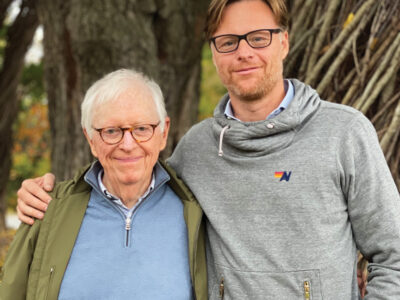
In the trenches with the Penn delegation —and one young alumna—at the UN’s annual climate conference.
Olivia Fielding C’21 laughed at the memory of her first time attending the United Nations Conference of the Parties (COP), which was the 26th iteration of the annual climate meeting. The place was Glasgow, Scotland, the time mid-November 2021, and she, a freshly minted college graduate with a double major in environmental science and political science, was in possession of a very hard-to-get Penn badge. “There were all of these professors and postdocs and little ol’ me feeling totally over her head,” she said. “I was trying really hard to soak up the lingo of negotiation and to learn the patterns of when that country always raised its flag to say this, and why this country always erupted over that innocuous phrase.”
As program director for the non-profit International Peace Institute (IPI), Fielding has returned twice more—to COP27 in Egypt in 2022 and COP28 in the United Arab Emirates in 2023, which drew some 85,000 participants.
The attention-getting takeaway from COP28 was a first-ever consensus resolution from all 197 participating nations to “transition” away from fossil fuels. But Fielding’s third time was the charm for her specific focus too, in advancing work on the Global Goal on Adaptation (GGA), which seeks to secure funding and establish measurable targets for ways to reduce vulnerabilities and boost resilience to the potential harms that climate change could bring to land, food, water, biodiversity, public health, and urban life.
The GGA came out of the Paris Agreement of 2015 but “was left pretty undefined,” said Michael Weisberg, interim director of the Perry World House. “Olivia was involved in the nitty gritty of the negotiations [to establish a framework for the GGA] by getting close to the negotiators,” and helped “give a lot of the intellectual shape” to the eventual agreement, added Weisberg, the University’s Bess W. Heyman President’s Distinguished Professor and Chair of Philosophy who was responsible for first bringing Fielding to COP in 2021.
Weisberg and Zeid Ra’ad Al Hussein, IPI’s president and chief executive officer and the Perry World House Professor of Practice of Law and Human Rights at Penn Carey Law, were intent on seeing the agreement ironed out at COP28. And they counted on Fielding’s diplomacy and smarts to make it happen. “We left her alone and she got amazing results,” said Ra’ad Al Hussein. “Her accomplishment should give hope to young people like my students who feel the world is so complicated and that they can’t possibly play a part in resolving its issues.”
Penn has been sending a delegation to COP since 2019. As with other universities, attendees are given observer status. Such badges are extremely limited in number, though—just 24 for last year’s conference. These included representatives from the Kleinman Center for Energy Policy, which cohosted, with Perry World House and Penn Global, COP’s Higher Education Pavilion and arranged some 30 panels showcasing the work of Penn researchers. “It was a huge event and showcased Penn at its best,” said Cory Colijn, the Kleinman Center’s executive director.
Other Penn affiliates attend as senior advisors to participating nations—Palau in the case of Weisberg and Ra’ad Al Hussein. “We are there to support the government teams, to come up with ideas, to try to find a way into the resulting texts and be in the room when negotiations take place,” said Ra’ad Al Hussein. “In this way, we’ve gained admission to the inner circle. Most universities are not in that position.”
That’s been Fielding’s trajectory post-graduation. “There was a huge shift for me from COP26 to COP27,” she said. “By 2022, I was working for IPI, and I had joined the partnership with the Maldives, which has its own small delegation. So I went from observer status with the Penn badge to party status. It was an awesome time for me.”
In 2023 she continued to work with the Maldives on its efforts to advocate for movement on the GGA, organizing and participating in four informal workshops, one of which she hosted in New York. A Maldives government change in October threatened to keep her from COP28 in Dubai, but a friend in the Surinamese government wangled a badge for her to attend. (Suriname, Palau, the Maldives, and 36 other low-lying nations comprise the membership of the Alliance of Small Island States (AOSIS), which are especially vulnerable to sea level rise and other global warming impacts.)
Then when she arrived at COP, “the politics came out,” Fielding recalled, with some frustration. “Suddenly there were all of these other issues that made adaptation end up feeling like a chess piece in a larger game. There was a lot to wade through, things got really tense and uncomfortable.” When she read through the final text hammered out by the negotiators, she was not happy with the results at first.
But later Weisberg helped her “think about where we had started, and to look for the key pieces that we really wanted to get in and that I had worked so closely with the AOSIS negotiators on,” she said. “We saw that some of the language that I had personally workshopped during the year had ended up being used.”
That so much haggling and hedging occurs during these two-week meetings may be the nature of negotiation, but some climate scientists find it maddening. After the conference ended, Penn Presidential Distinguished Professor in the Department of Earth and Environmental Science Michael Mann [“Mann in the Middle,” Jul|Aug 2023], for one, volubly decried COP’s choice of the UAE (a major oil producer) as host country, the unilateral consensus format, and the tepid tiptoeing of its resolutions.
Fielding gets it. “The negotiations can feel very futile,” she said. “But there’s no alternative for this kind of global decision-making, and if we just left it to individual countries, we’d be in a much worse position. This is the only forum for the work we need to do.”
Ever since she first met Weisberg at a summer study abroad program in the Galapagos, Fielding has known that the work she needed to do centered on climate change. “So, I do want to keep going to COP,” she said. “The goal on adaptation has been set, but now we’ll be concentrating on how we achieve and measure it. As I continue that work, though, I would like to add an on-the-ground component. I really want to be part of this adaptation in the vulnerable communities, not just a person on a laptop in New York.
—JoAnn Greco




